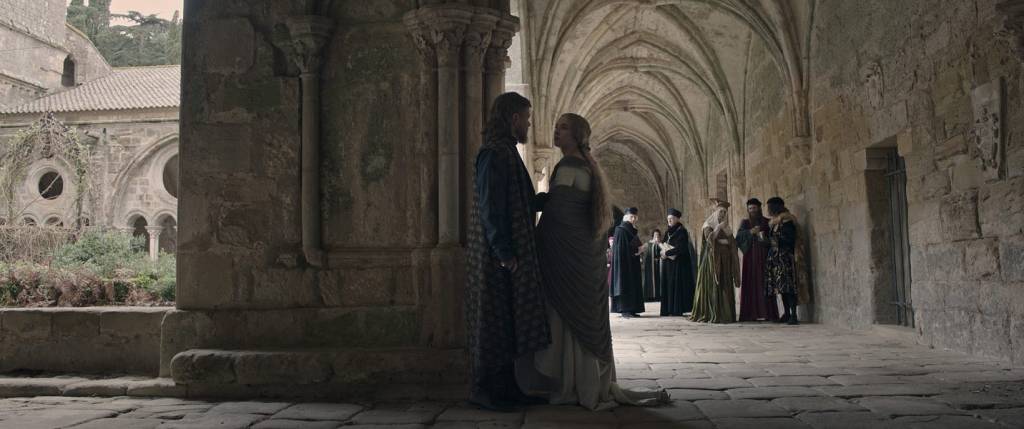Note: The following review includes spoilers and discusses key plot points.
The Last Duel is a curious mixture of a film. It is part medieval war movie, part courtroom drama, and part exploration of the horrors of sexual assault. It is also (mostly) all true. While Ben Affleck, Matt Damon, and Nicole Holofcener may have taken some creative liberties in writing up the tale of the last judicial duel allowed in France, the resulting film stays close to the basics of the case.
Damon does double duty, also starring in the film as Jean de Carrouges, a French knight married to Marguerite de Carrouges (Jodie Comer), who in the year 1386 AD accused her husband’s former friend Jacques Le Gris (Adam Driver) of rape. The film is split into three chapters, each one dedicated to one of the characters’ version of the truth. Jean de Carrouges’ portion shows him as a valiant warrior and a caring husband, a total (in internet parlance) wife guy, who just wants to avenge his wife; Le Gris’ chapter shows him as a lovable rogue, to whom women inevitably fall after the “customary protests” (as ladies must do to not seem easy, he claims at one point); and Marguerite de Carrouges’ shows her to be a clever and kind woman used in some capacity by all the men in her life. Jean de Carrouges may not be a rapist, but he is still controlling, abusive, and self-centered, viewing Marguerite as his property to the point that after she informs him of her assault he requires her to have sex with him so Le Gris isn’t the last man whom she was with. So obsessed with Jean with his honor that he proposes a duel to settle the case, despite the fact that his loss would mean Marguerite being put to a painful death.
The first two chapters bear some resemblance to the world of medieval Europe we’re accustomed to seeing in cinema; with fierce battles, brave knights, and courtly intrigue. Marguerite’s chapter shows how disgusting and patriarchal the time really was. While in real life the case remains unresolved due to lack of evidence (although it seems pretty likely that Le Gris raped Marguerite), The Last Duel has no such ambiguity: In the film, the assault took place. What follows is an examination of a judicial system prejudiced against women, one that shows how difficult it was to get justice at the time, and how some of those attitudes remain in how we view sexual assault cases today. (The rhetoric used in questioning Marguerite will certainly sound familiar to modern audiences. Jean essentially asks his wife if she was “asking for it” after she tells him of the rape.)
The acting is superb, with the three leads inhabiting their characters in such a way that makes the film difficult to watch at times. Joining the three leads in a supporting role, Ben Affleck gives a scene-stealing (and blond) turn as Count Pierre d’Alençon, Le Gris’ slimy benefactor and fellow pervert. Harriet Walter plays a small but important role as Jean’s mother, Nicole de Carrouges, who serves as a stand-in for victims of the era who gave up trying to find justice for themselves because of the difficulty in doing so. But it’s Comer who is the true standout of the film: She gives a heart-wrenching performance, as the film tracks her from a naive young woman being handed over to wed a strange man to a cynical survivor of sexual assault.
The Last Duel is undoubtedly meant as a commentary on the culture that gave rise to the Me Too movement. Which means, inevitably, some sort of political lines will be drawn and the movie will be declared too woke for some and not woke enough for others. Which is a shame; the film is beautifully crafted and tells a sad story that still has some relevance today.







Please note that we at The Dispatch hold ourselves, our work, and our commenters to a higher standard than other places on the internet. We welcome comments that foster genuine debate or discussion—including comments critical of us or our work—but responses that include ad hominem attacks on fellow Dispatch members or are intended to stoke fear and anger may be moderated.
With your membership, you only have the ability to comment on The Morning Dispatch articles. Consider upgrading to join the conversation everywhere.